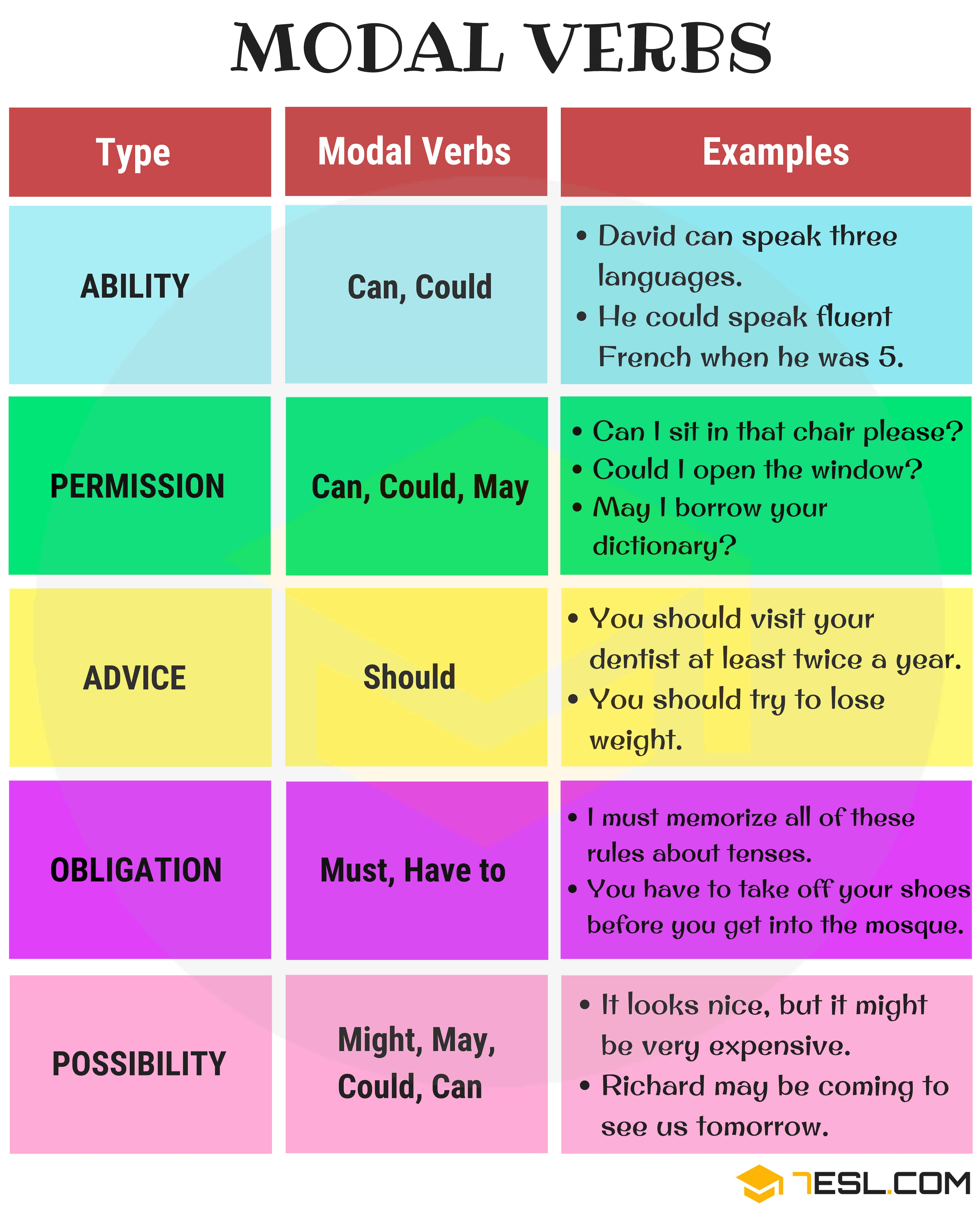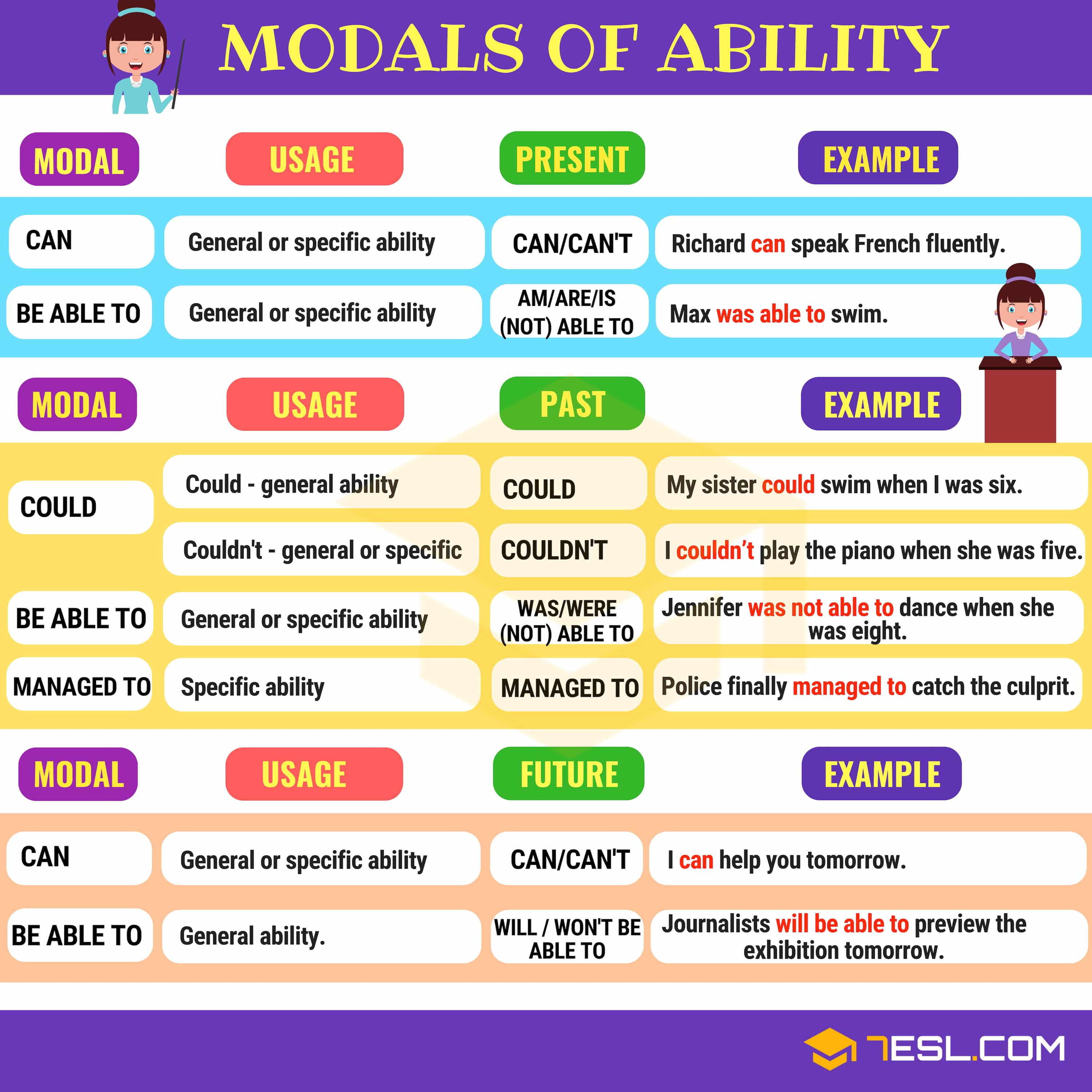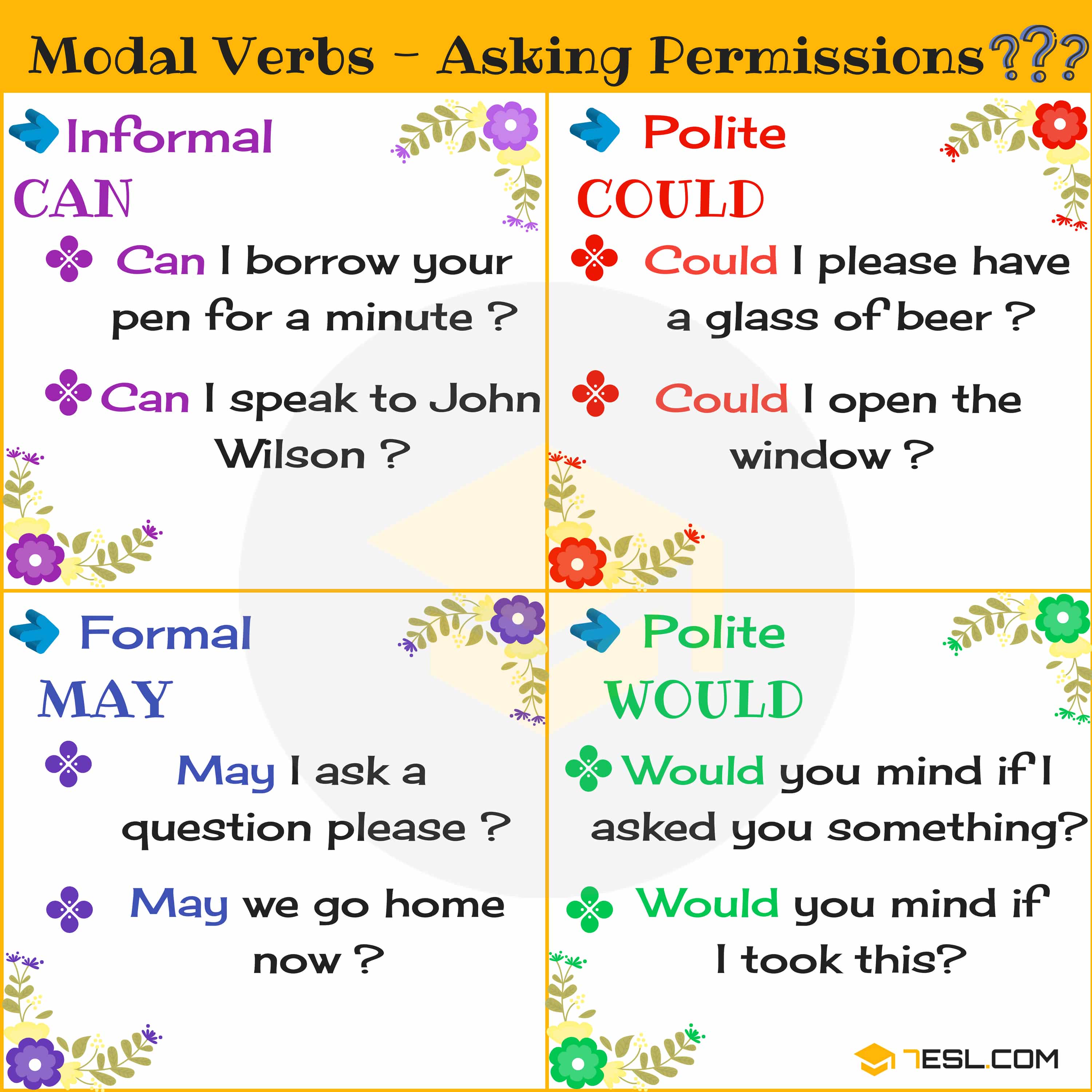What are modal verbs? A modal verb might also be referred to as a ‘helping’ verb and these are very common within the English language. Most people will see the word verb and think “doing words” because verbs are simply action words that show something happening in some way. However, reading the above article title might leave you scratching your head wondering what exactly modal verbs are.
Don’t worry though, this guide will set that out clearly, and we’ll take a look at some of the rules that are attached to modal verbs so you can always spot them easily. As always, we’ll use some examples to make the point even clearer too. Without further ado, let’s go and explore modal verbs!
Modal Verb
What is a Modal Verb?
Modal verbs are verbs that act very differently to the one’s you might be thinking of such as ‘work’, ‘play’, ‘eat’, etc. This is because modal verbs don’t actually describe action per se, instead they provide information about the function of the verb that is to follow. Modal verbs always come before a traditional verb, but they explain the modality of the verb. That sounds pretty confusing, so let’s just break down what exactly modality is!
Modal verb definition
In English, modal verbs are a small class of auxiliary verbs used to express ability, permission, obligation, prohibition, probability, possibility, advice.
Modality
This is just what the modal verbs can help explain further for the verb that follows. These include:
- Ability
- Permission
- Obligation
- Prohibition
- Probability
- Possibility
- Advice
These will be better understood in the examples that follow later, but it’s important that you know them now.
Examples of Modal Verbs
Thankfully, modal verbs are easier to understand with examples, because there is actually quite a shortlist of these uniquely behaving verbs. Below is a list of modal verbs in the strictest sense (there are examples of modal auxiliary verbs, but for now they don’t need to be looked at because our focus today is on modal verbs). Here they are:
- Can
- Could
- May
- Might
- Must
- Shall
- Should
- Will
- Would
All of these modal verbs must come before a verb to help express at least one of the modality examples listed above. In some cases, though they can be used to express more than one modality, but you’ll see more on that in the following section. So, let’s take a look at some example sentences and highlight how the modal verb is expressing modality and adding more information to the verbs that follow them.
Examples Sentences Containing Modal Verbs
Read the following examples and explanations carefully. The function and meaning behind modal verbs are best understood through sentence examples, rather than explanation, because you can see for yourself how the modal verb is impacting upon the verb to make the meaning behind the sentence clearer. We don’t have enough room to look at every modal verb, but we can give you some examples so that you can see how different modalities are being expressed, and then you will be able to spot them for yourself in future. Let’s take a look.
Can
‘I can run’ – is an example of the modal verb ‘can’ impacting upon the verb ‘run’. Here the modality that it is expressing is ability, because the individual is stating that they are able to run.
‘Can I borrow your trainers?’ – this sentence shows the modal verb ‘can’ impacting upon the verb ‘borrow’. But, you may notice that the modality is different. This time the modality expressed is permission, because the individual is seeking permission to borrow.
‘Running can make you ache’ – again, ‘can’ is impacting upon a new verb, ‘make’. The modality expressed this time is possibility, because the individual is stating that it is possible that running can make you ache.
Could
Often ‘could’ can be used to replace can to express modality in a slightly different way. Look at the first example for can again – if you changed ‘I can run’ to ‘I could run’ you are still expressing ability, but you are now expressing past ability instead. Try replacing could in the other two sentences too. You’ll notice that it can still be used to seek permission, and express possibility, but it just sounds slightly different and may be interpreted slightly differently by the reader or listener.
May
‘I may swim tomorrow’ – ‘may’ is being used here to express both possibility and probability. Because it could be both possible and probable that the individual swims tomorrow.
‘May I swim tomorrow?’ – in this instance we have simply moved the positioning of the words to create a new sentence. In this case the individual is seeking permission, so the modality expressed is permission again.
Might
In much the same was as could related to can, might relates to may. Try changing may in the above sentences, you’ll notice that might and may are interchangeable and both can be used to express probability, possibility, and permission.
Must
‘You must raise your hand before you speak’ – the modal verb ‘must’ is being used to express the modality of obligation by impacting upon the verb ‘raise’. The speaker is telling somebody what they are obliged to do, so must is being used to show that raising your hand is an obligation.
‘You must not speak out of turn’ – in this sentence by adding the word ‘not’ between the modal verb and the verb ‘speak’, the modality that is being expressed is prohibition, because the speaker is telling somebody what they are prohibited from doing.
Should
‘You should sing more often’ – this sentence is used to express the modality of advice. This is because the modal verb ‘should’ is being used to indicate that somebody is giving the advice to sing more to somebody else.
‘I should visit my mother’ – interestingly, should can also be used to express the modality of obligation, but in a slightly weaker sense than ‘must’ above. Here the speaker is stating that they ‘should’ visit their mother, which hints at an obligation, but not whether or not they will meet that obligation.
There are many other examples of modal verbs expressing different modalities towards different verbs, but hopefully this guide has gone some way to helping you understand modal verbs enough for you to go and use them, identify them, and understand their purpose in a sentence.
Modal Verbs
In this section, we are going to take a look at the modal verb in a little more detail as well as some examples of how it can be used, giving you a greater understanding of its function.
Modal Verbs List
Modal verbs list: the modals and modal phrases (semi-modals) in English are:
- Will
- Shall
- Would
- Should
- Ought to
- Must
- Mustn’t
- May
- Might
- Can
- Could
- Have to/ Has to
- Don’t/ Doesn’t have to
Modal Verbs Rules
There are certain rules which surround the use of modal verbs, for example the word ‘to’ must never be used after a modal verb. Learning these rules and how a modal verb can function within a sentence can greatly help you in forming grammatically correct sentences.
Will
The verb “will” is used to express:
- Promise: Don’t worry, I will be here.
- Instant decision: I will take these books with me.
- Invitation/Offer: Will you give me a chance?
- Certain prediction: John Smith will be the next President.
- Future tense auxiliary: Tomorrow I will be in New York.
Shall
The verb “shall” is used to express:
- Asking what to do: Shall I get the phone? Or will you?
- Offer: Shall I call a cab?
- Suggestion: Shall I call again on Thursday?
Would
The verb “would” is used to express:
- Asking for permission: Would you mind if I opened the window?
- Request: Would you make dinner?
- Making arrangements: Would you be available at 6 pm tonight?
- Invitation: Would you like to go out sometimes?
- Preferences: Would you prefer the window seat or the aisle?
Should
The verb “should” is used to express:
- Advice: You should visit your dentist at least twice a year.
- Recommending action: You really should go to the new museum on Main Street.
- Uncertain prediction: I posted the cheque yesterday so it should arrive this week.
- Logical deduction: I’ve revised so I should be ready for the test.
Ought to
The verb “ought to” is used to express:
- Advice: You ought to have come to the meeting. It was interesting.
- Logical deduction: 30$ ought to be enough for the taxi.
Must
The verb “must” is used to express:
- Obligation/necessity: I must memorize all of these rules about tenses.
- Deduction: She lied to the police. She must be the murderer.
Mustn’t
The verb “musn’t” (must not) is used to express:
- Prohibition: You mustn’t smoke in this restaurant. It’s forbidden.
May
The verb “may” is used to express:
- Possibility: Richard may be coming to see us tomorrow.
- Ask for permission: May I borrow your dictionary?
Might
The verb “might” is used to express:
- Slight possibility: It looks nice, but it might be very expensive.
- The past form of “may” in reported speech: The President said he might come.
Can
The verb “can” is used to express:
- Ability: David can speak three languages.
- Permission (informal): Can I sit in that chair please?
- Offers: Can I carry the luggage for you?
Could
The verb “could” is used to express:
- Request: Could I borrow your dictionary?
- Suggestion: Could you say it again more slowly?
- Ability in the past: I think we could have another Gulf War.
- Asking for permission: Could I open the window?
Have to/has to
The verb “have to/has to” is used to express:
- External Obligation: You have to take off your shoes before you get into the mosque.
Don’t/ Doesn’t have to
“Don’t/Doesn’t have to” is used to express:
- Is not necessary: You don’t have to do all the exercises, only the first one.
Modal Verbs | Chart

Using modal verbs to express ability
List of Modals of Ability:
- Be able to
- Can/Can’t
- Be able to
- Could/Couldn’t
- Managed to
- Be able to
- Can/can’t
Using modal verbs for asking permissions:
- Can
- Could
- May
- Would










0 Comments